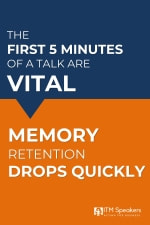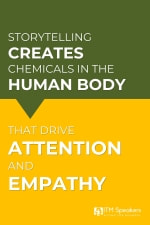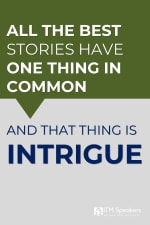 There is a thing called the Primacy Effect which is a psychological phenomenon associated with memory that says that items at the beginning (primacy) of a list or string of information are more easily recalled than items in the middle. That's why it's vital to start every meeting or presentation with something that drives intrigue. Nature has given speakers a gift in the first 5 minutes where what he or she introduces is more likely to be remembered. Most people don't use it. Don't open your talk with procedural information if you can avoid it. Start with something evocative. Even if you are just running a status meeting you could start by saying that the team is 15% ahead of schedule...or 15% behind. Start with a bang and then keep trying to introduce "moments of change" during your talk to maintain attention. Basically, with each moment of change you are resetting the listener's minds so that you get that instance of primacy again, and have 5 minutes of fresh attention. Use a story, question, move yourself, throw a ball, etc. to jar the viewer into a new mind set.
0 Comments
 When I teach classes I promise that everything I share is backed by science, research and experience. There is a lot of talk about storytelling and how it can be used in selling. That might be selling an idea to an audience, or selling a product to a consumer, but why does it work? Storytelling is a triple threat. A good story increases the amount of cortisol, dopamine, and oxytocin in the human body. Cortisol drives attention, dopamine keeps the viewer attentive by reinforcing with pleasurable feelings, and oxytocin promotes pro-social, empathetic behavior. Put that cocktail together and it drives human behavior in a way that's beneficial to the storyteller. The only bad news there is that you need to tell a GOOD story. Not everyone is a natural storyteller, or knows how to create a story that supports their business goals. The good news, is that those skills can be learned and there are good frameworks for stories that can be leveraged to help creativity.  Every time I talk to people about speaking and storytelling there is one word that I love to use. I love to use it both because it's accurate, but also because we don't get to use it much in day-to-day conversation. That word is....INTRIGUE! You don't have to be a infamous spy or thriller writer to use it, but you don't often hear it in polite conversation. But it describes what every public speaker should be striving for in their talks. Create intrigue! Make the people you're talking to want to hear how your story ends. Even if you are just having a status meeting try to find some little bit of information to hold back. Make people lean forward in their chairs. Even if it's just something as basic as, "At the end of the meeting I'm going to share some lessons the team learned over the past week." Is that a who-dun-it worthy of Alfred Hitchcock, no, but it doesn't have to be. If you're doing a main stage talk at a conference you can build in more drama, but always try to give people a reason to stay to the end. #training #communication #storytelling #itmspeakers  I make a living helping people be more concise, compelling and persuasive communicators, so today's theme might seem a little contradictory, but it's very true. I can come in and teach people skills, and even show them the science behind why what I teach works, but that doesn't help them if they don't practice and repeatedly apply that knowledge to create good habits. Developing a valuable ability requires the student to rinse and repeat to change knowledge into skill. Your brain is a muscle, and "muscle-memory" enables you to lock in skills so you don't have to think about them, and can improve them and layer new skills on top. Steph Curry doesn't think about shooting, but the tens of thousands of hours where he's taken knowledge to create skill from what he's learned are all buried in his amazingly consistent jump shot. Anyone who is great has two skills. One; they are open to learn from other's successes and failures, and two; they've practiced until their skills have been ingrained into them. #communication #presenting #training #storytelling #personaldevelopment #publicspeaking  I've worked with hundreds of career sales people, and while some of them are very confident speakers with great content, a lot of them display body language that conflicts with their words and limits their effectiveness. Here are a few things to think about. 1. Am I facing my audience and connecting with them, or am I referring too much to my slides? 2. Am I using body language that shows confidence and openness? 3. Do I focus on the people in the room and not the process of talking? Good body language changes a speaker's body chemistry to reinforce confidence and minimize stress. It's a bio-mechanical loop. The funny thing is that the audience reads it too, and it makes them more open to connect, listen and hear your message. #sales #training #communication #storytelling #bodylanguage |
Categories
All
Robert MattsonRobert is a speaker coach, actor, director, author, speaker, executive and overall marketing guy. He writes about all aspects of presenting and connecting with audiences. Archives
April 2019
|


 RSS Feed
RSS Feed